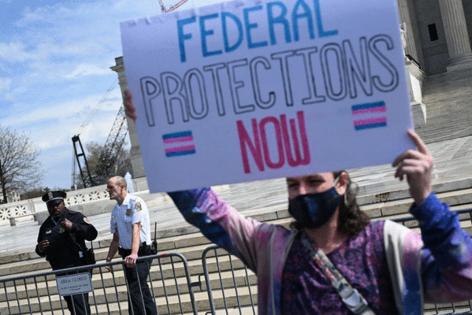Commentary: Taking trans rights to the Supreme Court isn't about politics
Published in Political News
The outcome of the 2024 election has resulted in no shortage of Democratic finger-pointing. While the postmortem and soul-searching are necessary, the tone and tenor of the blame game have begun to morph into something more insidious.
In the last weeks we have seen an increasing demand for the Democratic Party to abandon its association with political issues reflecting the “identity” of marginalized or vulnerable communities. While few constituencies have been spared recrimination, some of the most cynical and pernicious scapegoating has been reserved for the transgender community. This is deeply troubling because trans people are particularly vulnerable; with an estimated population of 1.6 million people nationwide, they are barely half of 1% of the U.S. adult population.
Transgender people face a disproportionate amount of discrimination. In the last year, more than 500 anti-trans laws were introduced in state legislatures. Over$215 million was spent on political ads demonizing trans people — despite polling showing trans-related issues were not a top priority for most voters. And even Congress is forming its own anti-trans brigade to ban the country’s first trans congresswoman from using the U.S. Capitol’s bathrooms.
Trans issues are not fringe issues. Equality, dignity and the ability to control our own bodies are interlinked for all of us, but especially for the trans community. It would be a dark day for civil libertarians to overlook the issues of personal agency tied up in the struggle for trans justice.
That’s why on Wednesday, the American Civil Liberties Union, where I serve as executive director, will argue a landmark case before the Supreme Court regarding the constitutional rights of families with trans children. United States v. Skrmetti will decide whether Tennessee violates equal protection by enacting a sweeping healthcare ban preventing adolescents, parents and doctors from making decisions around gender-affirming healthcare. That the court has decided to take up this case demonstrates that how we treat trans people in law and society is important for all of us.
Conservatives’ focus on trans rights is merely the next front in the attacks that brought about the overturning of Roe v. Wade. There is a throughline between trans rights and abortion rights: When the Supreme Court heard Dobbs v. Jackson Women’s Health, the justices were deciding whether a state could ban a form of healthcare that saved lives — just as they will in Skrmetti. By targeting one of the nation’s most vulnerable communities, conservatives are hoping the American people will shrug and let them do as they please.
The recent retrenchment on the political left and center may set back the cause of trans equality — and equal protection more broadly. Pundits are saying we need to course correct because we have moved too far left. Some will even argue that bringing a Supreme Court case on trans rights — at this moment — isn’t politically savvy. But everyone deserves civil rights and civil liberties, even if the group being targeted does not poll well among likely voters.
As the election postmortems continue, people should remember that the struggle for equality is rarely politically expedient or popular — especially at the outset. As a gay man, I vividly remember hearing from the Democratic establishment that gay equality was a losing proposition in the political arena. LBGTQ+ people understood that the Defense of Marriage Act, “Don’t Ask Don’t Tell” and California’s Proposition 8 were little more than rationalizations and gussied-up prejudice.
Looking further back, the struggles for civil rights and women’s equality were also unpopular with the public — especially white men — at their inception. It’s not a new phenomenon when voters in some states zealously resist any extension of federal civil rights into their communities.
Fighting for trans rights is not hard or complicated for those of us who believe everyone has the right to live free from discrimination. The next generation has far more expansive views on LGBTQ+ issues and trans rights than many of the old guard who populate the top rungs of political parties and institutions today. They will remember the organizations and people who showed conviction and courage in this moment.
Meanwhile, history is unlikely to look kindly upon the so-called leaders who chased polls and popularity at the expense of progress and principles. Betting on the future and fighting for trans equality is not just the right call — it’s an easy choice.
____
Anthony D. Romero is the executive director of the ACLU.
©2024 Los Angeles Times. Visit at latimes.com. Distributed by Tribune Content Agency, LLC.




























































Comments